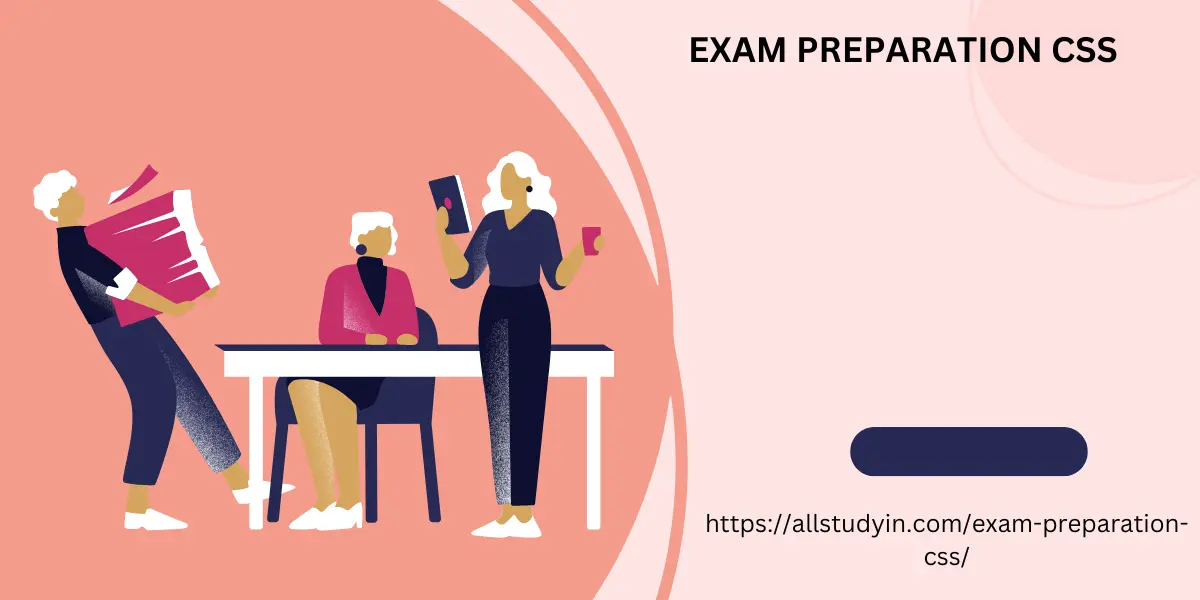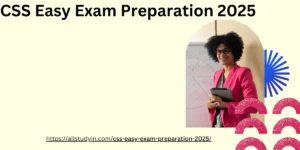Exam Preparation for CSS: A Complete Guide
Exam Preparation for CSS: A Complete Guide
Introduction
Exam Preparation for CSS: A Complete Guide A Complete Guide A Complete Guide (Central Superior Services) exam in Pakistan is a challenging but rewarding journey. This highly competitive exam offers candidates a chance to secure prestigious government positions. To succeed, a well-structured study plan is essential. Let’s dive into the steps you need to take to start your CSS preparation and achieve success.
Understanding the CSS Exam
What is CSS?
The CSS exam is conducted by the Federal Public Service Commission (FPSC) of Pakistan to recruit candidates for civil service positions. It is one of the most competitive exams, aiming to select individuals for various departments and ministries.
Eligibility Criteria for CSS
Exam Preparation for CSS: A Complete Guide
To appear for the CSS exam, candidates must meet specific eligibility requirements, which include:
- Nationality: Must be a citizen of Pakistan or a permanent resident of Azad Jammu and Kashmir.
- Education: A minimum of a Bachelor’s degree (14 years of education) from a recognized university.
- Age: Candidates must be between 21 and 30 years old, with a two-year relaxation for certain groups.
- Physical Fitness: Candidates must meet health standards, including height and fitness requirements.
Candidates are allowed up to three attempts to clear the CSS exam.
CSS Exam Pattern
The CSS exam consists of four stages:
- Written Examination: This includes six compulsory and six optional subjects.
- Medical Examination: Ensures the candidate is physically fit.
- Psychological Assessment: Evaluates mental and emotional stability.
- Viva Voce: An interview to assess the candidate’s personality and suitability for civil service.
Effective Memory Techniques for CSS Preparation
EExam Preparation for CSS: A Complete GuidExam Preparation for CSS: A Complete Guide: A Complete Guide can feel overwhelming due to the vast syllabus. However, employing effective memory techniques can significantly improve your retention and recall abilities.
How Memory Works
Memory involves three stages: encoding, storage, and retrieval. It is divided into three types:
- Sensory Memory: Briefly holds sensory information.
- Short-Term Memory: Temporarily holds information for processing.
- Long-Term Memory: Stores information for an extended period.
General Memory Improvement Techniques
- Healthy Lifestyle: Maintain a balanced diet rich in brain-boosting foods like berries and fish. Exercise regularly to promote blood flow to the brain, and get enough sleep to aid memory consolidation.
- Stress Management: High stress can impair memory. Techniques like meditation and deep breathing can help reduce stress and improve focus.
- Spaced Repetition: Review information at increasing intervals to enhance long-term retention.
Choosing the Right Study Materials
- Recommended Books: Use expert-recommended books like those by Jahangir’s World Times and Dogma Publishers.
- Online Resources: Platforms like CSS Forums and YouTube channels provide valuable lectures, notes, and practice questions.
Practice Tests
Taking practice tests is essential to familiarize yourself with the exam format and time management. This will also help identify areas for improvement.
Time Management for CSS Preparation
Effective time management is crucial for CSS exam success. Establish a daily routine that includes dedicated study periods and time for rest and leisure.
- Set Milestones: Break your study plan into phases and set achievable goals.
- Avoid Procrastination: Stay disciplined and set short-term goals to keep yourself on track.
Improving Writing Skills
- Essay Writing: Practice writing essays on various topics to improve clarity and coherence.
- Answering Questions: Learn to answer questions briefly and accurately. Practice under timed conditions to simulate the exam environment.
Mock Exams and Self-Assessment
Mock exams are vital for preparing for the actual exam. They simulate the exam environment, helping you build resilience and identify weaknesses. After each mock exam, analyze your performance and adjust your study plan accordingly.
Common Mistakes to Avoid in CSS Preparation
Underestimating Planning
Many candidates dive into their studies without a structured plan. This can lead to feeling overwhelmed by the extensive syllabus. A well-thought-out plan breaks the syllabus into manageable chunks and sets clear goals.
Inadequate Understanding of the Syllabus
Some candidates overlook the syllabus details, which can lead to focusing on irrelevant topics. Carefully review the syllabus to prioritize topics with higher weightage and relevance to the exam.
Poor Selection of Optional Subjects
Choosing optional subjects based on popularity rather than personal strengths is a common mistake. Select subjects that align with your interests and background to improve your chances of success.
Conclusion
Preparing for the CSS exam is a challenging but rewarding experience. By following a structured study plan, using the right resources, and employing effective study techniques, you can confidently take on the exam and achieve your goals. Remember, consistency and determination are key to your success.
FAQs
- How early should I start preparing for the CSS exam? Ideally, start preparing at least one year in advance to cover all subjects thoroughly.
- Are coaching classes necessary for CSS preparation? Coaching classes are not mandatory but can provide structured guidance and expert insights.
- How can I improve my essay writing skills for the CSS exam? Practice writing essays regularly and seek feedback from mentors.
- What is the passing mark for the CSS exam? You need to score at least 40% in compulsory subjects and 33% in optional subjects to pass.
- Can I retake the CSS exam if I fail? Yes, but candidates are allowed a maximum of three attempts.
Stay consistent, stay focused, and good luck with your CSS exam preparation!
External Links:
- Federal Public Service Commission (FPSC) – For official details on eligibility criteria, syllabus, and exam schedule, visit the FPSC Official Website.
- CSS Forums – Engage with peers and access valuable resources by joining CSS Forums, where you can discuss strategies and share notes.
- Higher Education Commission (HEC) – For information about degree recognition and educational qualifications, visit the HEC Official Website.
Internal Links:
- CSS Preparation Guide – Learn more about how to create a well-structured study plan in our Comprehensive CSS Study Plan Guide.
- Essay Writing Tips for CSS – Struggling with essay writing? Read our Top Tips for CSS Essay Writing to improve your writing skills.
- Time Management for Exams – For more on how to manage your time effectively during exam preparation, check out our article on Effective Time Management Strategies.
You can use these links within your article for a smooth user experience and SEO optimization.


